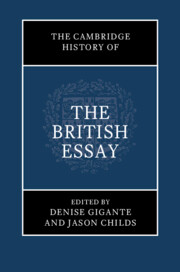Book contents
- The Cambridge History of the British Essay
- The Cambridge History of the British Essay
- Copyright page
- Contents
- Illustrations
- Contributors
- Acknowledgements
- Preface to a History in the Manner of an Essay
- Part I Forming the British Essay
- Part II The Great Age of the British Essay
- Part III Assaying Culture, Education, Reform
- 20 The Essay and the Theme
- 21 The Academic Essay: Rhetoric and Pedagogy
- 22 The Essay and the Rise of University English
- 23 Victorian Essays in Criticism
- 24 Nineteenth-Century Reviews Reviewed
- 25 Essays in the ‘Golden Age’ of the British Newspaper
- 26 The Essay in the Age of Chartism
- 27 Political Theory and Ethics in the Victorian Essay
- 28 Plain English: Essays and Analytic Philosophy
- Part IV Fractured Selves, Fragmented Worlds
- Part V The Essay and the Essayistic Today
- Book part
- Bibliography
- Index
26 - The Essay in the Age of Chartism
from Part III - Assaying Culture, Education, Reform
Published online by Cambridge University Press: 31 October 2024
- The Cambridge History of the British Essay
- The Cambridge History of the British Essay
- Copyright page
- Contents
- Illustrations
- Contributors
- Acknowledgements
- Preface to a History in the Manner of an Essay
- Part I Forming the British Essay
- Part II The Great Age of the British Essay
- Part III Assaying Culture, Education, Reform
- 20 The Essay and the Theme
- 21 The Academic Essay: Rhetoric and Pedagogy
- 22 The Essay and the Rise of University English
- 23 Victorian Essays in Criticism
- 24 Nineteenth-Century Reviews Reviewed
- 25 Essays in the ‘Golden Age’ of the British Newspaper
- 26 The Essay in the Age of Chartism
- 27 Political Theory and Ethics in the Victorian Essay
- 28 Plain English: Essays and Analytic Philosophy
- Part IV Fractured Selves, Fragmented Worlds
- Part V The Essay and the Essayistic Today
- Book part
- Bibliography
- Index
Summary
How does an essay change when it appears in a newspaper, aimed at a mass reading public that includes people of varied class backgrounds? This chapter takes up how periodical publication shaped nineteenth-century essays, looking at the effects of serialisation, republication through excerpting, and the intertextual nature of Victorian journals and papers. It explores how the political journalism and social protest movements of the 1830s and 1840s influenced the essay, in contrast to the notion that political campaigning is opposed to the contemplative and reflective values associated with the genre. Focusing on Thomas Carlyle’s response to the social movements of his time, the chapter argues that not only did Carlyle engage ideologically with popular protest but that the writing he encountered in the radical press shaped his style by encouraging an oratorical mode, melodramatic language and rhetorical excesses.
Keywords
- Type
- Chapter
- Information
- The Cambridge History of the British Essay , pp. 389 - 404Publisher: Cambridge University PressPrint publication year: 2024

